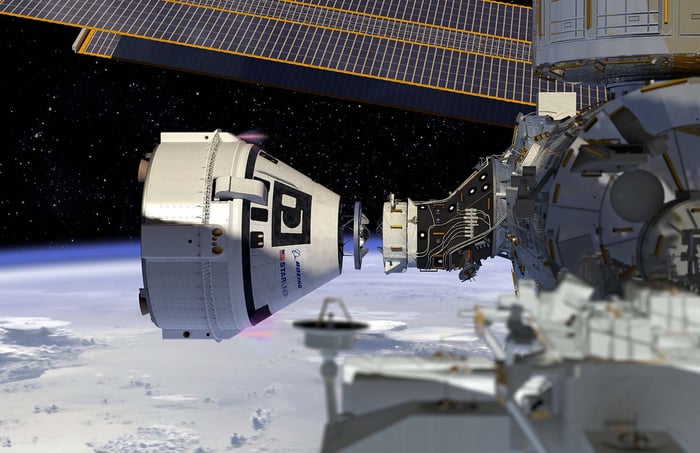Last November, the FAA finally lifted the grounding order for Boeing's (BA -0.43%) 737 MAX after 20 months. That allowed the aerospace giant to resume deliveries of its top-selling model before year-end.
Long-suffering Boeing shareholders hoped that this milestone marked the end of an unfortunate but isolated episode. Unfortunately, new problems have continued to crop up across the enterprise in 2021, further eroding management's credibility. Until Boeing improves its execution, investors should probably continue to steer clear of the company.
Wide-body jet programs in shambles
While 737 MAX deliveries have now resumed, Boeing's wide-body aircraft families have emerged as new weak spots in its product lineup. Production of the 747 jumbo jet will end next year. Boeing has slashed output of its next-largest model -- the 777 -- to just two per month. Most of those are freighters, as demand for the passenger variants has virtually disappeared.
The next-generation 777X was supposed to revive demand for large passenger jets. However, while the first delivery was originally scheduled for 2020, it was delayed to late 2023 earlier this year. Even hitting that target may be impossible. The FAA recently slowed the certification process, as Boeing has not fully addressed problems uncovered in early flight tests last December. And nearly eight years after officially launching the 777X program, Boeing has just eight confirmed customers for the type.

Image source: Boeing.
Meanwhile, the 787 Dreamliner has experienced a series of production miscues. Boeing has periodically identified new manufacturing flaws over the past year, forcing it to halt deliveries again and again. It delivered just two 787s in the first quarter, and after starting to get back on track in April, it had to halt deliveries again in May. The industrial giant has slashed 787 production as it tries to get a handle on its quality-control problems.
Ironically, the venerable 767 has been the steadiest performer of Boeing's wide-body models in 2021. However, new emissions rules will likely force Boeing to stop building commercial variants of the 767 by 2028.
Another setback for the space program
Unfortunately, Boeing's commercial jet business isn't the only part of the company struggling with major execution problems. Earlier this month, Boeing had to cancel its planned Starliner uncrewed test flight to the International Space Station, after 13 valves in the propulsion system failed to open on command.
The Starliner's first test flight last year went awry due to software glitches, necessitating a redo this year (at the company's expense). After spending more than a week trying to fix the Starliner capsule while still attached to an Atlas V rocket, Boeing recently acknowledged that it will have to take the capsule back to a Boeing facility to identify and address the root cause of the latest problem.

This artist rendering remains the closest Boeing's Starliner capsule has gotten to docking with International Space Station. Image source: Boeing.
The latest malfunction will delay the Starliner's second test flight by months (at least), while adding to Boeing's expenses. And with every setback, the risk that NASA abandons the Starliner program grows. After all, SpaceX has already operated multiple successful crewed missions for NASA.
Still a company in turmoil
Boeing has certainly had some successes in 2021. Most notably, it has won several big orders for the 737 MAX, including one for 200 MAX 8s and MAX 10s from United Airlines. The company also managed to return to profitability last quarter.
That said, Boeing's aircraft order backlog has barely increased year to date, as cancellations have offset most of the new orders the company has won. Moreover, its backlog remains nearly 30% smaller than it was at the end of 2018. This backlog erosion alone will keep Boeing's earnings and cash flow well below the highs reached a few years ago.
The widespread execution problems across Boeing's business -- ranging from 787 production to the 777X development process to the Starliner -- make the company an even less attractive investment prospect. Management doesn't seem to have a handle on the company's operations, raising the risk of further costly problems. Simply put, Boeing needs to master the basics of running a high-tech industrial business to be a worthy investment.





